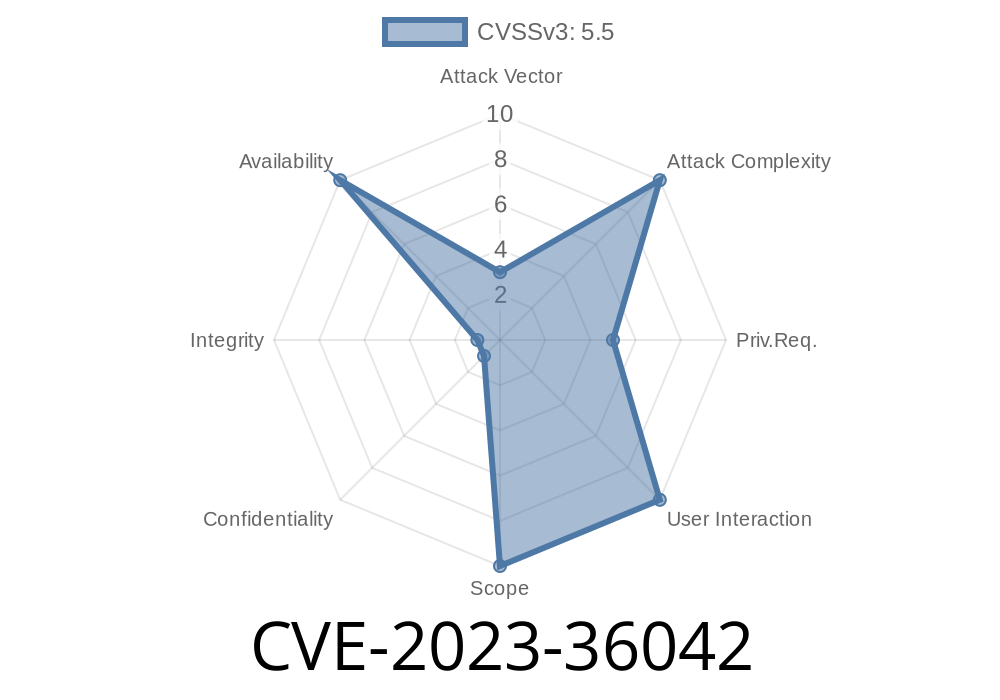Visual Studio is widely used by developers all over the world. But like any piece of software, it can have security flaws. In late 2023, a vulnerability with the ID CVE-2023-36042 was publicly disclosed, highlighting a serious Denial of Service (DoS) flaw in Visual Studio. If you’re a developer or sysadmin, you’ll want to understand this bug—not just what it is, but how it works, what can happen, and how to protect yourself.
Below, we break it down using simple language, include an illustrative code snippet, provide official references, and explain the exploit to help you fully grasp what's at stake.
What Is CVE-2023-36042?
CVE-2023-36042 is a vulnerability found in several versions of Microsoft Visual Studio—Microsoft’s flagship programming environment. The bug allows an attacker to crash Visual Studio by tricking it into processing a specially crafted file. By causing Visual Studio to hang or shut down unexpectedly, attackers could disrupt development workflows or cause loss of unsaved work.
Visual Studio 2022 version 17.4.10
If you haven't updated Visual Studio since June 2023, your installation may still be at risk.
How Does the Exploit Work?
When Visual Studio opens a maliciously crafted file (for example, a project or source file sent over email, or downloaded from the internet), it can run into a processing loop or memory issue, causing it to freeze or shut down.
While this flaw does not allow code execution or privilege escalation, it can be used to interrupt work, possibly as part of a larger attack or just to cause inconvenience.
Proof of Concept: What Would the Attack Look Like?
Below is a representative, simplified proof-of-concept. Note: Do not use code like this in production or send it to others without permission. This is for educational purposes, showing the nature of specially crafted files that trigger parser bugs or long processing loops.
Step 1: Craft a Project or Source File
Let’s imagine Visual Studio has a problem when parsing certain long or recursive XML structures in .csproj files (this is a hypothetical illustration, not the actual disclosed bug):
<?xml version="1." encoding="utf-8"?>
<Project Sdk="Microsoft.NET.Sdk">
<PropertyGroup>
<RecursiveTag>
<RecursiveTag>
<RecursiveTag>
<RecursiveTag>
<!-- ...repeat many times... -->
</RecursiveTag>
</RecursiveTag>
</RecursiveTag>
</RecursiveTag>
</PropertyGroup>
</Project>
This huge recursion might exploit a bug in how Visual Studio parses project XML, causing stack overflow or infinite loops, leading to a DoS condition (freeze/crash).
Upload it to a public sample site
If a developer opens the file with Visual Studio, the IDE processes it and crashes or becomes unresponsive.
Exploit Details
The real CVE-2023-36042 vulnerability details were not publicly disclosed in full, likely to prevent easy copycat attacks. Microsoft only described it as “a denial of service vulnerability that can be exploited by opening a maliciously crafted file.” Researchers noted that it’s not a remote or automatic attack—the victim must actually open the file in Visual Studio.
Official References
- Microsoft Security Update Guide - CVE-2023-36042
- NIST National Vulnerability Database Entry
- Visual Studio Release Notes (Bug Fix)
Don’t open project or source files from untrusted locations or unknown senders.
3. Use Antivirus/Endpoint Protection
Summary
CVE-2023-36042 is a medium severity bug that lets attackers crash Visual Studio simply by persuading a developer to open a crafted file. This kind of Denial of Service doesn’t let hackers take over your computer, but it can waste your time, lose your progress, or be used as a distraction in wider attacks. The fix is straightforward—update Visual Studio as soon as possible. Stay safe, and always be careful what you open!
*This article is part of our exclusive series breaking down real vulnerabilities for every developer. If you found it helpful, consider bookmarking it for reference or sharing with your team.*
Timeline
Published on: 11/14/2023 18:15:34 UTC
Last modified on: 11/20/2023 19:13:02 UTC
